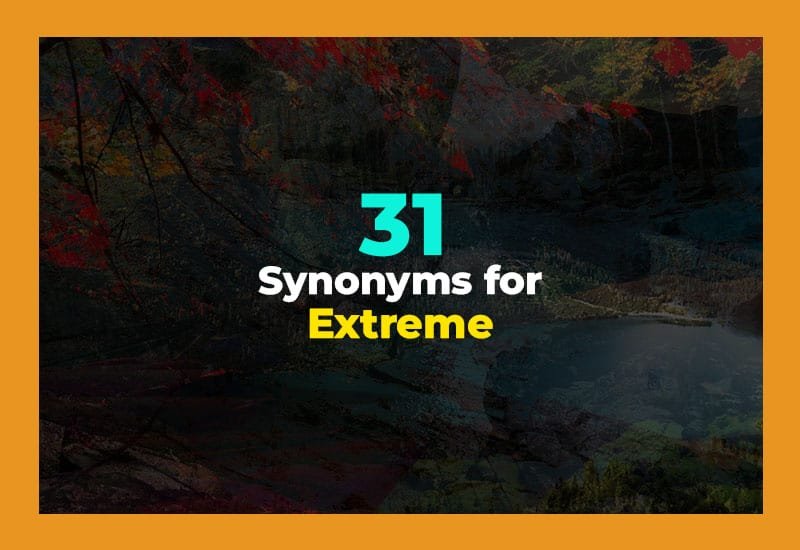When you want to describe something that is very strong, intense, or beyond normal, using the word extreme is common. However, there are many other words that can make your sentences more interesting and precise. Words like severe, radical, and ultimate can fit different situations. In this article, we will explore 31 synonyms for extreme with their meanings and examples.
| Synonym | Meaning | Example |
|---|---|---|
| Intense | Very strong or powerful | The heat was so intense that we had to stay inside. |
| Severe | Very bad or serious | She suffered from severe headaches last night. |
| Excessive | Going beyond what is normal | His excessive talking annoyed everyone in the room. |
| Radical | Very different from the usual | They made radical changes to the company rules. |
| Drastic | Extreme and sudden | We had to take drastic measures to fix the problem. |
| Acute | Very strong, severe, or serious | He felt acute pain in his leg after the fall. |
| Exaggerated | Made to seem bigger, better, or worse than true | Her reaction was exaggerated for the small mistake. |
| Overwhelming | Very strong, more than one can handle | The amount of work was overwhelming for the team. |
| Profound | Very deep or intense | His words had a profound effect on the audience. |
| Ultra | Going beyond the normal limits | She is an ultra-modern artist with unique ideas. |
| Ultimate | The highest or final | Winning the championship was his ultimate goal. |
| Maximum | The greatest possible amount | The car can reach a maximum speed of 200 km/h. |
| Utmost | The greatest in degree | She showed the utmost respect to her teacher. |
| Paramount | More important than anything else | Safety is of paramount importance in this factory. |
| Supreme | Highest rank or quality | He felt supreme happiness when he saw his baby for the first time. |
| Peak | The top or highest point | We reached the peak of the mountain just before sunset. |
| Highest | At the top level | He received the highest score in the class. |
| Far-reaching | Affecting many things or people | The new rules had far-reaching consequences for students. |
| Topmost | At the very top | The topmost branch of the tree was broken during the storm. |
| Pinnacle | The highest point of achievement | Becoming a CEO was the pinnacle of her career. |
| Fanatical | Extreme interest or enthusiasm | He is fanatical about keeping his house clean. |
| Radicalized | Changed in extreme ways | The group became radicalized after the incident. |
| Outrageous | Shockingly unusual or extreme | His outrageous behavior surprised everyone at the party. |
| Immoderate | Not within reasonable limits | His immoderate eating caused stomach problems. |
| Excess | More than is necessary or normal | The excess sugar in his diet affected his health. |
| Severe | Very harsh or extreme | The storm caused severe damage in the town. |
| Intemperate | Lacking control, extreme | His intemperate actions led to serious consequences. |
| Wild | Very uncontrolled or extreme | The wild party lasted all night. |
| Extreme-edge | At the farthest point of something | He pushed himself to the extreme-edge in sports. |
| Fierce | Very strong, powerful, or aggressive | The fierce wind knocked down several trees. |
| Exceptional | Much better than normal | She has exceptional talent in painting. |
31 Different Ways to Say EXTREME: Another Word for EXTREME
Intense
Intense means something is very strong or powerful. You can use it to describe feelings, situations, or experiences that are overwhelming. Intense is often used for emotions like love, fear, or excitement, but it can also describe things like heat, colors, or work. For example, if you are studying for a test and you feel completely focused, that is intense concentration. It can also show strong effects or results in everyday life. People use this word to show that something goes beyond normal levels.
- The heat in the desert was intense.
- She felt an intense sadness after the movie.
- The competition was intense, and everyone tried their best.
Severe
Severe means very bad, serious, or strong. It is used when something is extreme in a negative way. This could be pain, weather, damage, or punishment. Severe problems need careful attention and action. For instance, severe storms can damage houses, and severe headaches can stop someone from working. This word is useful when describing situations that are beyond normal or acceptable limits.
- He suffered from severe frostbite during the trip.
- The teacher gave severe warnings to the noisy students.
- Severe traffic made everyone late to work.
Excessive
Excessive means more than what is normal, necessary, or reasonable. It is often used to describe actions, amounts, or behavior that go too far. For example, eating excessive sweets can harm your health. It is also used for talking, spending, or working too much. Using this word helps explain that something is extreme and should be reduced to a better level.
- Her excessive talking annoyed everyone.
- Excessive noise made it hard to sleep.
- He showed excessive pride after winning the prize.
Radical
Radical is used when something is very different from the usual or traditional. It often refers to changes, ideas, or actions that are extreme. Radical ideas can be positive or negative depending on the situation. People use radical changes to solve big problems quickly, but sometimes they can be risky. The word helps explain strong actions that break the normal rules or habits.
- They made radical changes to the school’s schedule.
- His radical idea improved the company's profit.
- The government introduced radical reforms last year.
Drastic
Drastic refers to actions or changes that are sudden and extreme. Drastic solutions are usually taken when normal methods do not work. This word shows urgency and seriousness. You can use it in everyday life for problems, decisions, or events that need strong action to solve. It implies that moderate steps are not enough.
- They took drastic measures to prevent the fire.
- The doctor suggested drastic treatment for the illness.
- The company made drastic cuts to save money.
Acute
Acute means very strong, severe, or serious. It is often used for pain, illness, or situations that need immediate attention. Acute problems can be dangerous if not handled quickly. The word can also describe sharpness in understanding or perception. Using acute helps emphasize that something is beyond normal levels and needs focus.
- He felt acute pain after the accident.
- The patient was in acute distress.
- There is an acute shortage of water in the village.
Exaggerated
Exaggerated means making something seem bigger, better, or worse than it really is. People use this word to show that the situation or feeling is more than it should be. It can describe emotions, expressions, or physical appearances. Exaggerated actions can sometimes be funny or dramatic, but they are not accurate.
- Her reaction was exaggerated for the small mistake.
- The actor's exaggerated expressions made the scene funny.
- He gave an exaggerated version of the story.
Overwhelming
Overwhelming is used when something is too strong or powerful to handle. It can describe feelings, tasks, or situations that are very hard to manage. Overwhelming experiences can be emotional, physical, or mental. The word helps show that the intensity of something is extreme and affects people strongly.
- The amount of work was overwhelming for her.
- He felt overwhelming joy when he met his old friend.
- The noise in the city was overwhelming.
Profound
Profound means very deep, serious, or intense. It is used to describe thoughts, feelings, or effects that are strong and important. Profound experiences can change how someone thinks or feels. The word shows that the impact is beyond ordinary understanding. It is often used in learning, thinking, or emotions.
- His words had a profound effect on the audience.
- She felt profound sadness after losing her pet.
- The book gave him profound insights into life.
Ultra
Ultra means beyond the normal limits, very extreme, or advanced. It is used to describe things that are far ahead in style, technology, or quality. Ultra can also show extreme behavior or enthusiasm. Using this word emphasizes that something is not ordinary but highly advanced or powerful.
- She is an ultra-modern designer.
- The athlete used ultra-light shoes for running.
- He has ultra-high standards for his work.
Ultimate
Ultimate means the highest, final, or most important. It is used for goals, results, or achievements that are at the top level. Ultimate can describe the end point of effort or progress. It shows that something is extreme in quality or importance.
- Winning the championship was his ultimate goal.
- The ultimate decision rests with the manager.
- This is the ultimate solution to the problem.
Maximum
Maximum means the greatest possible amount or level. It is used to describe limits in numbers, speed, size, or effort. Maximum helps set the extreme point someone can reach. It is often used in rules, laws, or physical limits.
- The car can reach a maximum speed of 200 km/h.
- He ate the maximum portion allowed.
- The temperature reached its maximum today.
Utmost
Utmost means the greatest degree or amount. It is used to describe respect, care, effort, or attention that is very high. Utmost shows that someone is giving everything they can.
- She showed the utmost respect to her teacher.
- He worked with utmost dedication.
- The company took utmost care of its customers.
Paramount
Paramount means more important than anything else. It is used to describe priority or value that is at the top. Paramount shows extreme importance and focus on something essential.
- Safety is of paramount importance in the factory.
- The issue of education is paramount for the country.
- Trust is paramount in any relationship.
Supreme
Supreme means highest in rank, quality, or power. It is used to describe something that is better or more important than everything else. Supreme is often used for feelings, achievements, or authority.
- He felt supreme happiness after winning the race.
- The team showed supreme skill in the game.
- Justice should be supreme in society.
Peak
Peak means the top or highest point. It is used to describe mountains, achievements, or moments of intensity. Peak shows the extreme top level someone can reach.
- We reached the peak of the mountain.
- Her career was at its peak last year.
- The athlete performed at peak level during the match.
Highest
Highest means at the top level. It is used for ranking, quality, or position. Highest shows the extreme point compared to others.
- He received the highest score in the class.
- The building is the highest in the city.
- She gave the highest effort in the project.
Far-reaching
Far-reaching means affecting many people, areas, or situations. It is used for decisions, consequences, or events that have a wide impact. Far-reaching shows the extreme effect something can have.
- The new rules had far-reaching effects.
- His speech had far-reaching influence on the community.
- Technology changes have far-reaching consequences.
Topmost
Topmost means at the very top. It is used for physical position, rank, or level. Topmost emphasizes the extreme top position.
- The topmost branch of the tree was broken.
- She reached the topmost level in the game.
- The topmost shelf is hard to reach.
Pinnacle
Pinnacle means the highest point of achievement. It is used for success, career, or experiences. Pinnacle shows the extreme peak someone can reach.
- Becoming a CEO was the pinnacle of her career.
- Winning the medal was the pinnacle of his efforts.
- Reaching the pinnacle requires hard work and focus.
Fanatical
Fanatical means having extreme interest, enthusiasm, or devotion. It is used for hobbies, beliefs, or actions. Fanatical people focus strongly on what they love.
- He is fanatical about keeping his house clean.
- She is fanatical about photography.
- They were fanatical supporters of the team.
Radicalized
Radicalized means changed in extreme ways, often in behavior, beliefs, or actions. It shows a strong shift from normal or moderate ways.
- The group became radicalized after the incident.
- Radicalized opinions can lead to conflicts.
- He was radicalized by new ideas at school.
Outrageous
Outrageous means shocking, unusual, or extreme. It can describe actions, behavior, or situations that surprise or upset people.
- His outrageous behavior shocked everyone.
- She wore an outrageous dress to the party.
- The prices in the store were outrageous.
Immoderate
Immoderate means not within reasonable limits. It is used for behavior, eating, or spending that is extreme.
- His immoderate eating caused stomach problems.
- She showed immoderate enthusiasm in class.
- Immoderate use of social media can be harmful.
Excess
Excess means more than necessary or normal. It is used for amounts, actions, or behavior. Excess shows that something is extreme and should be reduced.
- The excess sugar in his diet affected his health.
- There was an excess of food at the party.
- Excess spending caused financial problems.
Severe
Severe means very harsh, serious, or extreme. It is used for damage, weather, or actions that are beyond normal.
- The storm caused severe damage in town.
- He faced severe punishment for the crime.
- Severe weather warnings were issued today.
Intemperate
Intemperate means lacking control or moderation. It is used for actions, behavior, or speech that are extreme.
- His intemperate actions led to problems.
- She was intemperate in her criticism.
- Intemperate drinking caused health issues.
Wild
Wild means very uncontrolled, extreme, or unusual. It is used for parties, behavior, or situations that are beyond normal.
- The wild party lasted all night.
- He made wild guesses about the answer.
- The wild storm uprooted trees in the city.
Extreme-edge
Extreme-edge means at the farthest point of something. It is used for sports, actions, or challenges that push limits.
- He pushed himself to the extreme-edge in climbing.
- The athlete reached the extreme-edge of his strength.
- Extreme-edge sports require courage and skill.
Fierce
Fierce means very strong, powerful, or aggressive. It is used for animals, weather, competition, or emotions. Fierce shows intensity and extreme strength.
- The fierce wind knocked down trees.
- They had a fierce battle on the field.
- She gave a fierce speech to motivate the team.
Exceptional
Exceptional means much better than normal. It is used for talent, skills, or performance that stand out. Exceptional shows high quality and extreme ability.
- She has exceptional talent in painting.
- His performance in the exam was exceptional.
- The chef prepared an exceptional meal.

Final Thoughts
There are many words that can replace extreme to make your writing more vivid and precise. Using synonyms helps describe intensity, importance, or limits in a better way. Choosing the right word allows you to communicate ideas more effectively and express emotions or actions clearly.









